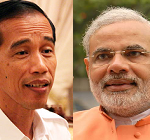The official results have been declared, and Joko “Jokowi” Widodo, the populist Governor of Jakarta, has won a close victory in the Indonesian presidential election.
There are several practical economic reasons to be interested in this election’s outcome. Indonesia is a large exporter of coal, edible oils, and other raw materials; India imports these resources and more, and so any change in Indonesian trade policy will affect how India continues to source these from Indonesia. In addition, there is the question of whether Indonesia’s high rates of growth can be sustained. Mr. Widodo has proposed a change in economic policy, in particular supporting greater welfare for the poor, expanding anti-corruption measures, and more investment in education.
However, what does the Indonesian election mean more generally for India, as another major Asian country to have an election this year? What insights can we draw from comparing each new administration’s victories? One answer comes from journalist Pallavi Aiyar who argues that Indonesia is surprisingly similar to India, both in terms of its attributes and the challenges the country will face in the future.
There are also some immediate differences. The BJP won a landslide victory in the Indian Parliament, in contrast to Widodo’s more close victory against his opponent. Indians chose Narendra Modi indirectly as opposed to Indonesia’s direct elections. Finally, Modi’s economic policy is focused on large-scale infrastructure projects and foreign investment, as opposed to Widodo’s focus on income inequality and corruption.
But a deeper look at both elections reveal some fundamental similarities. First, while the nature of the Indian election process gave the BJP a landslide victory, an actual look at the popular vote reveals that the party has come into power with the lowest share of the popular vote in Indian history. In addition, both elections seemed like referendums on a single candidate: Modi in India, and Widodo in Indonesia.
These elections also reveal some of the underlying ethnic and religious divisions that persist in both populations. Mr. Widodo’s sharp drop in popularity over the past year was partly attributed to a smear campaign that alleged that he was both a secret Christian and a descendent of Chinese immigrants. The Indian election was not free of ethnic and religious pandering either.
Both countries face similar challenges in managing the ethnic, linguistic and religious amalgamation that are the Indian and Indonesian populations. They must also judge how to liberalise their economies while simultaneously protecting the welfare of their poorest citizens. Their shared positions at the center of various maritime routes mean that both will have concerns about the vitality and ease of global trade. And, finally, both countries have similar security interests, both internationally (dealing with China’s rise) and domestically (suppressing Islamic militarism and extremism).
It may thus be more useful to see Indonesia, not China, as India’s parallel. China is often cited as the model for economic development; the assumption is that if something works in China, it will work elsewhere. The current buzz around Modi’s “smart cities” and high-speed rail have antecedents in Chinese projects.
However, China, unlike diverse India, is mono-cultural, mono-ethnic and mono-lingual. It is also more politically and economically centralised, and, perhaps most importantly, does not respect the same set of political and civil rights that India does. Chinese developers may be willing to steamroll their plans over an unwilling public, but India cannot (and perhaps knows better than to try to) do the same.
Given that “Chindia” is now more often said as an expression of disappointment rather than optimism, perhaps India should look elsewhere for a parallel and partner in economic development—namely, Indonesia.
Nicholas Gordon is an intern at Gateway House: Indian Council on Global Relations.
This blog was exclusively written for Gateway House: Indian Council on Global Relations. You can read more exclusive content here.
For interview requests with the author, or for permission to republish, please contact outreach@gatewayhouse.in.
© Copyright 2014 Gateway House: Indian Council on Global Relations. All rights reserved. Any unauthorized copying or reproduction is strictly prohibited.


